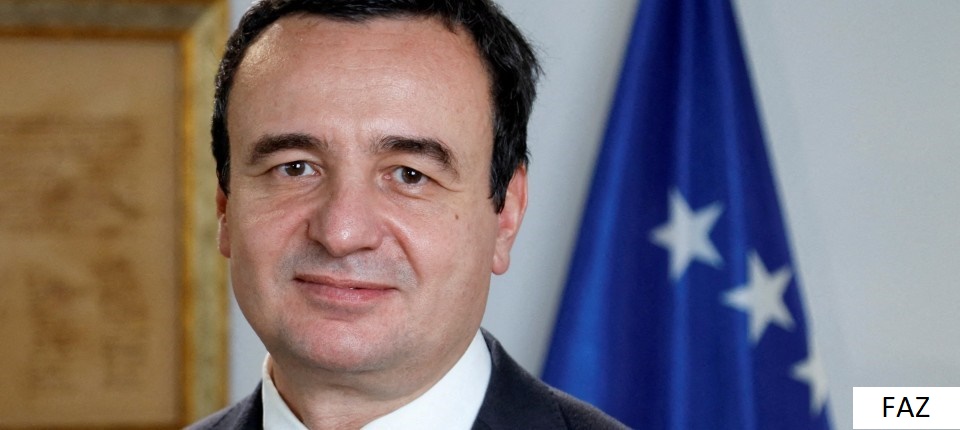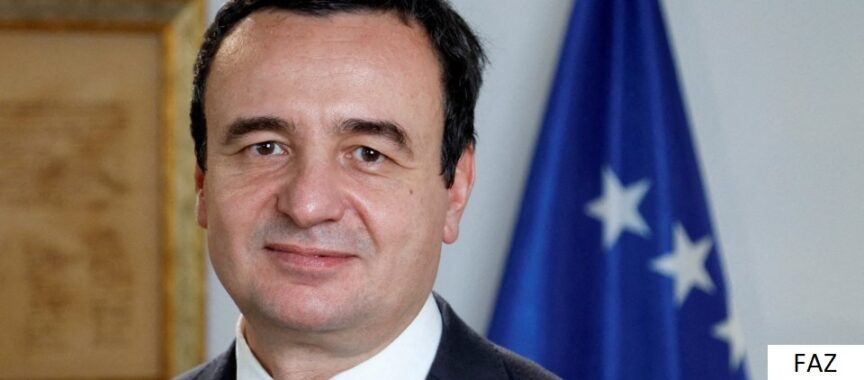Unofficial translation
Below you will find the interview translated into Albanian by Prime Minister Kurti with journalist Michael Martens, conducted on November 26 and published in Frankfurter Allgemeine Zeitung on November 29.
THE HEAD OF KOSOVO GOVERNMENT, KURTI: “In December we will submit our EU membership application”
FAZ: Prime Minister, thanks to American and European mediation, the “license plate crisis” in Kosovo seems to have subsided, at least for the moment. What is the essence of the compromise?
Prime Minister Kurti: We have agreed not to implement our decision to fine drivers with illegal Serbian license plates. Serbia has agreed to stop issuing license plates inherited from Slobodan Milosevic’s regime. We did this not only to avoid escalating the situation, but also to create an opportunity for the quick dialogue for a full normalization of relations between Kosovo and Serbia. These should be completed before spring 2023. That was the real purpose of the compromise.
FAZ: EU’s foreign policy chief, Josep Borrell, criticized you in an extremely clear way for the early failure to find a compromise. Are you a stubborn person – or was Borrell wrong?
Prime Minister Kurti: I’m not stubborn, I’m principled. There are principles and values that I adhere to and that I do not negotiate in Brussels. We do not go to Brussels to negotiate for police officers, prosecutors, customs officers and cadastral managers. We are there as representatives of two states that are negotiating for normalization of their relations. In principle, it is about a dialogue for an agreement, not just a dialogue about crisis management. We do not need dialogue for the sake of dialogue or to show that Brussels is active. I wouldn’t have gone to Brussels if it was just about license plates. I will go to Brussels to conclude a comprehensive agreement. However, Mr Borrell insisted that we only sign a license plate statement and present this as a great success. That was the main disagreement I had with him.
FAZ: You were a political prisoner in Serbia when the current president, Aleksandar Vučić, was Minister of Propaganda in the Milosevic regime. Does it make conversations difficult or do you hold back your feelings?
Prime Minister Kurti: I never try to hold my feelings. Emotions are an important part of who we are and what we do. But I also have enough experience to let reason decide what I say or don’t say. I was not released from Serbian custody last year, but more than 20 years ago. The main problem for me is not what Mr. Vučić has been, but that even today he does not regret what he was. Instead of regretting being Milosevic’s Minister of Information, he regrets that I was released from prison more than a year after Milosevic’s fall. He has said this several times and it irritates me. It’s not about what I went through in prison, but about the fact that Serbia has changed so little.
FAZ: There has been a lot of talk about a Franco-German initiative to resolve the conflict between Serbia and Kosovo. What does this plan envisage?
Prime Minister Kurti: On September 9, I was visited by EU Special Envoy Lajčák and Jens Plötner and Emmanuel Bonne, foreign policy advisors to the German Chancellor and French President. What they presented seemed like a very serious initiative. They brought me a list of models and ideas, which we discussed at length before taking them to Belgrade. I told them that I thought this would be a good basis for further talks.
FAZ: Why should Aleksandar Vučić be interested in a compromise with Kosovo when the reward he once hoped for – Serbia’s membership in EU – is no longer realistic?
Prime Minister Kurti: More than nine months have passed since the Russian invasion of Ukraine, and Serbia has gone too far on Russia’s side, too far. Anyone who discovers that Serbia will not join EU in the foreseeable future should remember that not only does Brussels not love Belgrade, but Serbia prefers Moscow.
FAZ: However, the agreement is not failing only because of Serbia. Your predecessors have promised that Serbian enclaves and settlement areas in Kosovo will be allowed to join in an association of municipalities. You are blocking this, why?
Prime Minister Kurti: Serbia continues to say that it will never recognize Kosovo. They say that Kosovo is an artificial state. But in this supposedly artificial state, they want a real association of municipalities. The Serbian solution is: “You don’t exist – but we want something from you.” It won’t work like that. Second, when you ask for something, always keep in mind that the same request can be made to you. Minorities make up about eight percent of the population in Kosovo and about 20 percent in Serbia. Serbia should think about the principle. Also, our constitutional court has decided that Serbian association of municipalities is not pursuant to Kosovo constitution.
FAZ: A key principle of your policy towards Serbia is reciprocity. Can you imagine a model in which Serbian minority in Kosovo gets exactly the same rights as the Albanian minority in southwestern Serbia?
Prime Minister Kurti: I am for the reciprocity of the rights of all minorities throughout Balkans. This is the formula of peace. Minority rights are important to fight nationalist domination. But Belgrade’s intention has nothing to do with Serbs rights. Serbia wants these rights to be territorialized and that is something completely different. Belgrade wants Serbian communities to form a union, but I don’t know of any Serbs in Kosovo who would want that. Every week I receive dozens of letters from Serbian citizens of our country. It’s about all kinds of things, jobs, rule of law functioning and so on. No one writes: ‘We need a community association’. Only Mr. Vučić says this.
FAZ: However, EU and Washington seem to insist on creating an association of municipalities. Is preventing it more important to you than jeopardizing relations with Western allies?
Prime Minister Kurti: 33 agreements have been reached in Brussels during the last decade. Two thirds of them have not been implemented by Serbia. I accept that these 33 agreements exist and I am ready to consider them when official talks on the normalization of our relations based on Franco-German proposal in Brussels begin. But Serbia would like to single out one agreement and ignore the other 32, including the Franco-German proposal. But I’m not for that. When we talk about the normalization of our relations, I am ready to talk about communities and rights of Serbian minority – not as a precondition for talks, but as part of them.
FAZ: Where does Kosovo stand in Council of Europe membership application?
Prime Minister Kurti: We are counting on the support of our partners and friends so that the vote for our admission to the Council of Europe takes place as soon as possible. In addition, we will formally submit our application to join EU in December. Of course we know that membership is not coming anytime soon. But it is important that we express our will to join EU officially, formally and publicly.
Last modified: December 1, 2022

